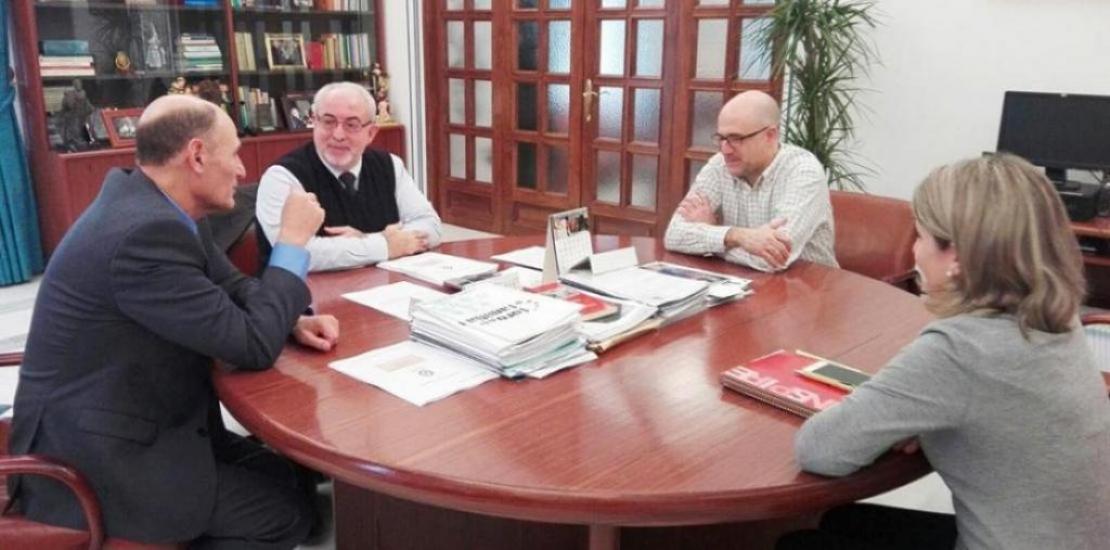Curing multiple sclerosis, closer thanks to UCAM research led by Izpisua
The study, promoted and financed by the Catholic University, led by its researchers Juan Carlos Izpisua and José Meca, and with the collaboration of the Hospital Virgen de la Arrixaca, has a clear Murcian stamp.
The prestigious journal 'Stem Cell Research' has announced the important advances of the study led by Dr. Juan Carlos Izpisua to the international scientific community. The findings conclude that premature ageing of nerve cells is one of the factors that causes multiple sclerosis. This result paves the way for the use of cellular rejuvenation techniques to prevent, delay or reverse the symptoms of the disease.
The study was launched on the initiative of José Luis Mendoza, president of UCAM. This is the university that promotes and finances it, and which has brought basic research, directed by Juan Carlos Izpisua, professor of Developmental Biology at UCAM and professor at the Gene Expression Laboratory of the Salk Institute, in La Jolla (USA), together with clinical research, led by José Meca, director of the UCAM Chair of Clinical Neuroimmunology and Multiple Sclerosis and director of the Multiple Sclerosis Unit at the Hospital Virgen de la Arrixaca.
The research, in which other Murcian scientists are participating, has made it possible to create an experimental model based on reprogrammed cells from patients with this disease at the Hospital Virgen de la Arrixaca, an institution that is participating in the project. Until now, the limited knowledge of this pathology was due, in part, to the lack of access to the affected nerve cells, which were needed in order to study them. This is why the models generated in this study are a very valuable tool for the entire scientific community, with the aim of discovering new drugs and cell replacement therapies for the treatment of the disease.
Given that most of our current knowledge is derived from experimental animal models, Dr José Meca explained that "from a diagnostic point of view, we do not have specific biomarkers that are useful for differentiating between the different types of multiple sclerosis, nor for establishing an accurate prognosis in terms of the severity of its evolution".
In this study, advances in cell reprogramming technologies from adult cells (iPS cell generation) have made it possible to create specific stem cells for each patient which included their complete genetic history. In this respect, Dr. Izpisua explained that "the results obtained point to the premature senescence (ageing) of the patients' nervous system cells as one of the causes of the disease, which opens up the possibility of applying cellular rejuvenation techniques, previously developed with UCAM, aimed at preventing this process and thus delaying or reversing the symptoms of multiple sclerosis".
"As neurodegeneration and neurosenescence are related, identifying markers of neurosenescence could be very useful to establish an early differential diagnosis between progressive and relapsing-remitting forms of the disease, and thus being able to identify new therapeutic targets to cure it" said José Meca.
The research team now continues to work on cell models obtained from patients and laboratory animals, on which previously designed epigenetic modification technologies are applied. Furthermore, it is testing molecules with therapeutic potential.
Multiple sclerosis
Multiple sclerosis is a chronic, progressive, neurodegenerative disease that causes the loss of myelin and the death of neurons, leading to disabilities of the brain and spinal cord. Symptoms of the disease include speech and vision difficulties, inability to walk, lack of coordination and even death, in severe cases. It is the most common cause of neurological disability of non-traumatic origin in young adults, mainly women. Seventy percent of all cases are diagnosed between the ages of 20 and 40, so its impact on patients' personal, work and family life is very high. There is currently no treatment to cure it; the available therapies focus on delaying the severity of the disease.
Crowdfunding
The Universidad Católica de Murcia, which has been financing this research with its own resources for three years, opened it up to crowdfunding through the FECYT's Precipita platform, which belongs to the Ministry of Science and Innovation, with the aim of increasing the resources and speeding up the results.
Dr. Juan Carlos Izpisua; José Luis Mendoza, president of UCAM; Dr. José Meca and Estrella Núñez, vice-rector of Research at the University, at the meeting where the research project was launched.




